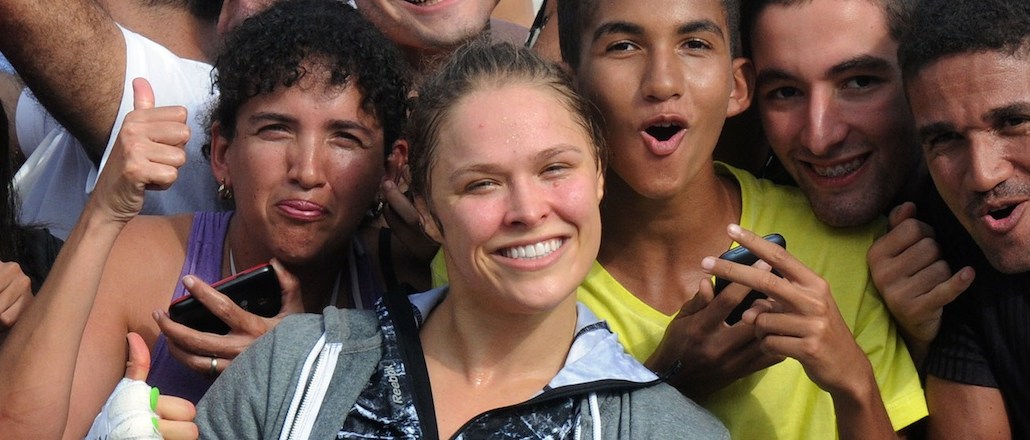
Mixed martial arts fighter Ronda Rousey is having a kick-ass week. The 28-year-old champion roundhoused her way into the national spotlight last weekend for her record-breaking 34-second win over Brazil’s Bethe Correia to claim the UFC women’s bantamweight title.
But her success hasn’t been overnight. The fighter has deals with Reebok, Carl’s Jr. and lifestyle brand Buffalo David Bitton in her portfolio and has had cameos in films like “Entourage” and “Furious Seven.” She is also set to play herself in a biopic based on her own life and bestselling autobiography “My Fight/Your Fight,” produced by Paramount Pictures.
“What she represents for the sport and women is transcending any other female athlete right now,” said Jeff Brecker, vp and managing director at R/GA Chicago.
The ascent of Rousey’s personal brand is something that brands can learn a thing or two from. Here’s how Ronda Rousey does it:
By challenging convention
Rousey’s story is that of the archetypal underdog. A few years ago, no one could have imagined a female fighter emerging at the forefront of the UFC landscape the way Rousey has. By resolutely chasing after her passion, she has managed to carve a niche for herself in a sport that has traditionally been male-centric. The strength, agility and self-confidence that she has displayed as a fighter (who happens to be a woman) has allowed her to differentiate herself and made everyone take notice.
“You have to stand for something; you have to differentiate yourself,” said Erich Joachimsthaler, CEO of branding firm Vivaldi Partners. “Lots of brands forget it. There is so much sameness, so much brand blandness.”
By being unafraid to speak her mind
There is no doubt that Rousey is brave in the ring, but what makes her even more endearing is that she has also always been unafraid to speak her mind outside of it. She has championed body positivity and spoken out against being body-shamed on social media recently. In the UFC series “Embedded,” she said, “I think it’s femininely badass, because there’s not a single muscle in my body that isn’t for a purpose.” She also took a potshot at Floyd Mayweather Jr., after winning Best Fighter over him at this year’s ESPYs. She made a comment that alluded to both Mayweather’s history of violence against women, as well as his previously being unaware of who she was.
“Ronda Rousey delivers the one-two punch that every brand needs to attract a loyal fan base: confidence and authenticity,” said Tim Maleeny, chief strategy officer at Havas Worldwide. “She’s a populist champion, on one hand a total badass but on the other totally approachable.”
Most brands, when criticized by haters, do their best to ignore it as conflict is perceived as bad for business, said Shankar Gupta-Harrison, vp of strategy at 360i. But Rousey cuts loose. “It sure hasn’t been bad for Ronda’s personal brand,” he said.
By being personable and approachable
Rousey may crush opponents in the ring with death stares and steely punches but has a fun, approachable and authentic personality outside. Recently, when a little fan surprised her during an open workout in Rio de Janeiro by running up to her and embracing her, she hugged him right back.
Rousey has a personality that adds to her human story or narrative, which is something that brands often forget. “An average fan can see the depth of her character,” said Louis Marino, executive creative director of experiential at R/GA New York. “She is spontaneous and that speaks to her character.”
By being socially savvy
The axiom is that what appeals to a Facebook audience is different from what appeals to an Instagram audience and so on. Yet, brands often take a lazy approach by circulating the same content across platforms. Rousey has a distinct personality, but has also figured out how to showcase different sides of it on different platforms. Her Instagram feed (4.2 million followers) is a window into her daily life, while her Facebook page (6.4 million followers) is littered with more professional announcements.
A photo posted by rondarousey (@rondarousey) on
“She’s really good at being opportunistic with social media and recognizing cultural topics,” said Aaron Dodez, vp of digital marketing at RPA. “Her clout — driven by past actions and the fact that she can grace the cover of magazines looking beautiful one day while beating her opponents senseless the next — has provided her a whitespace that is not filled by any other sports athlete.”
More in Marketing

YouTube’s upmarket TV push still runs on mid-funnel DNA
YouTube is balancing wanting to be premium TV, the short-form powerhouse and a creator economy engine all at once.

Digiday ranks the best and worst Super Bowl 2026 ads
Now that the dust has settled, it’s time to reflect on the best and worst commercials from Super Bowl 2026.

In the age of AI content, The Super Bowl felt old-fashioned
The Super Bowl is one of the last places where brands are reminded that cultural likeness is easy but shared experience is earned.





